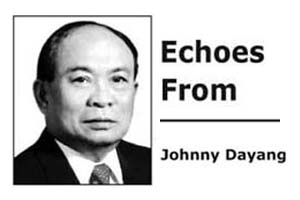THROUGHOUT its entire existence, the Duterte administration has mastered, consciously or otherwise, the art of self-infliction, hurting itself when there was no need really to embrace policies that destabilize the status quo.
The first self-inflicted wound was when the President declared a change of foreign policy, bragging the country would veer towards China and Russia because the US has treated the Philippines, a long-time ally, has never been given its due in terms of support and assistance.
For all the good intentions the new policy carries, the Philippines has only been getting the short end of all the deals we have with China and insulted for our win in the UN arbitral court.
Because we have bowed to China’s overtures, the Beijing demigods created islands inside our contested zones and sent militia crafts camouflaging as fishing ships in Philippine territory to bully Filipino fishers, harass the Coast Guard, and stop military supply vessels. Even when Filipino trust on the Chinese hit bottom, the President was unchanging in its worship of Beijing.
Perhaps the deepest wound it has self-inflicted is the denial that human rights violations do not exist in the archipelago. By so doing, the Duterte regime has discredited reports gathered from diverse but reliable sources using government files and public statements.
Adding injury to self-inflicted wounds was the statement that the government would stop receiving aids, grants, and loans from countries that supported the draft UN resolution of Iceland, which condemned human rights violations in the islands. The government, by doing this absurd retort, only exposes its lack of resolve to confront and address global perceptions, accurate or not, that have long-term implications in the way we pursue our foreign policies.
Verily, it is not a sin to criticize the claims other nations have slapped on us. But, it is a misstep when the country, angered by what it perceives as foreign intervention in domestic affairs, turns down positive offers that are not tied to anything but the welfare of the Filipinos.
When the President downgraded diplomatic ties with Canada for the failure of a private firm to return the garbage to its country of origin, what it did was right. But amid the insults that attended the case, the administration did not ban Canadian assistance and grants. Even when the order for Canadian choppers was cancelled, no mention was made on aids and grants.
In global diplomacy, the best policy is still bridging people and nations. When a President attaches importance to braggadocio, the country losses its valued sheen.


